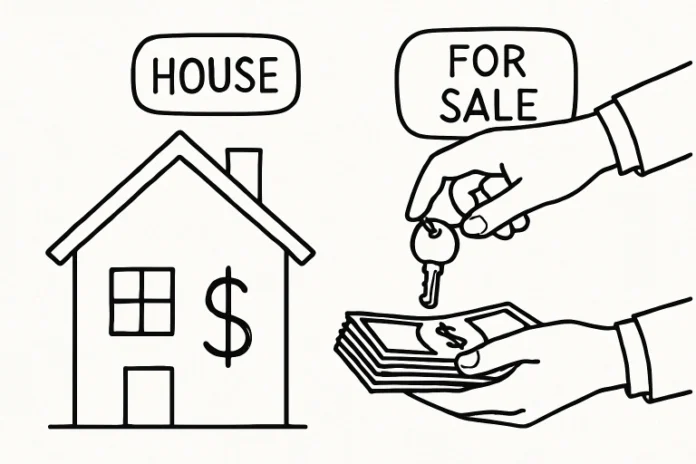A cash offer is when a homebuyer proposes to purchase a property outright, using their own funds and without needing a traditional mortgage loan. Unlike financed offers, where the buyer relies on a lender’s approval and a lengthy underwriting process, cash offers skip many common hurdles. This accelerates the sale and provides peace of mind to sellers, especially when working with direct buyers who specialize in quick transactions. Homeowners considering this route often find it to be a straightforward alternative that eliminates the risk of financing falling through at the last minute.
There are common myths around cash offers, such as the notion that only investors or “house flippers” make them, or that all cash offers are low-ball bids. In reality, anyone with sufficient funds can present a cash offer, including individuals looking for a primary residence. The defining factor is the lack of lender involvement, which sets a cash transaction apart from the typical home-selling process.
Table of Contents
Why Do Sellers Choose Cash Offers?
- Speed: Cash sales can close in as little as a week, compared to several weeks with financed deals.
- Reduced Paperwork: Fewer contingencies and faster document processing.
- Certainty: Cash deals are less vulnerable to last-minute surprises, like loan denials.
Many homeowners opt for cash offers to avoid the stress and delays of traditional financing, particularly if they need to move quickly or have already purchased another property. According to recent reports from the National Association of Realtors (NAR), the prevalence of cash deals is rising, especially as mortgage conditions become more restrictive.
Working with fast buyers can further simplify this experience. These companies streamline every phase from evaluation to closing, helping sellers avoid repairs, cleaning, or protracted negotiations.
Step-by-Step Breakdown of the Cash Offer Process
- Initial Contact: The buyer reaches out (or the seller inquires), and basic property information is exchanged. This includes address, home condition, and motivations for selling.
- Evaluation and Offer: The cash buyer assesses the property, often remotely or with a brief on-site visit. They present a formal written offer, typically within 24-48 hours.
- Negotiation and Acceptance: While cash buyers often aim for a win-win outcome, there may be room for discussion about timing, price, or included items. Once terms are agreed, the seller signs an agreement.
- Due Diligence: This stage includes inspections, reviewing the title, and verifying there are no liens or legal encumbrances on the property. Unlike traditional buyers, cash offers rarely include financing or appraisal contingencies.
- Closing and Payment: After final checks, both parties sign closing documents—often at a title company or lawyer’s office. Sellers receive funds via wire transfer or certified check, often the same or next business day.
These steps are designed to protect both parties while minimizing delay, which is attractive for homeowners with urgent needs or complicated situations.
How to Compare Cash Offers vs. Financed Offers
- Sellers weighing their options should consider several key factors:
- Appraisal Requirements: Financed deals generally require a formal appraisal. Cash buyers usually skip this, allowing for greater flexibility.
- Closing Timelines: Financed offers take longer to close, while cash offers can move forward in a few days.
- Negotiating Power: Cash significantly reduces the likelihood of complications, giving sellers more peace of mind, even if the final price is lower.
Ultimately, the choice depends on your specific priorities: speed and certainty, or maximizing sale price.
Tips for Getting the Best Deal on a Cash Offer
- Request Multiple Offers: Competition between buyers can drive up your final price, even in cash transactions.
- Know Your Value: Get a professional opinion or use online valuation tools to assess your property’s market value before entering negotiations. This positions you to evaluate lowball offers objectively.
- Use Your Inspection Report: If you know your home’s potential repair needs, you’ll be better prepared to negotiate deductions fairly rather than accepting arbitrary reductions.
Maximizing your net proceeds requires both preparation and a willingness to negotiate thoughtfully.
What to Watch Out for When Dealing With Cash Buyers
- Predatory or Low-Ball Offers: Be cautious of buyers who pressure you to accept an offer significantly below market value with little explanation.
- Proof of Funds: Always request verifiable documentation showing that the buyer has available funds to complete the transaction.
- “Bait and Switch” Tactics: Avoid deals in which the buyer changes the offer terms or makes last-minute deductions for inflated or unjustified repairs.
These potential pitfalls are uncommon among reputable companies, but vigilance is always warranted.
Also Read: How to Save Money on Home Remodeling: A Budget-Smart Guide
Resources and Support for Home Sellers
Consider consulting a local real estate agent or attorney before signing any offers. The Consumer Financial Protection Bureau provides guides and tools for home sellers and buyers. Additionally, the Nolo legal encyclopedia is valuable for understanding your rights and obligations during a cash sale.
Whether you’re motivated by speed, certainty, or a desire to avoid costly repairs, the cash offer process offers a viable route for many homeowners. You can confidently manage each step from first contact to closing with the right preparation and understanding.
